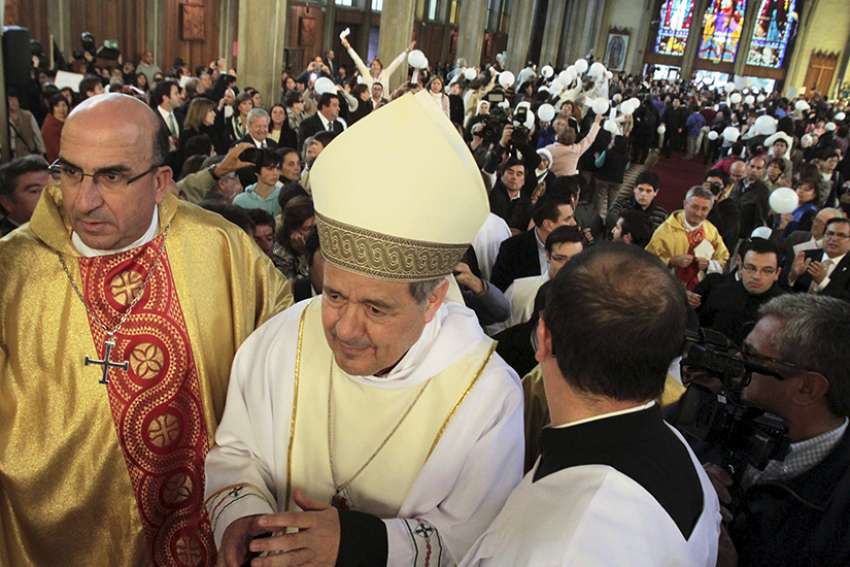Bishop Juan Barros attends his first Mass at the Cathedral of St. Matthew in Osorno, Chile, Mar. 21, 2015. The Vatican said it had no reason to preclude Bishop Barros' nomination after protestors charged he had covered up for a priest whom the Vatican later found guilty of sexually abusing minors.
CNS photo/Carlos Gutierrez, Reuters
Pope received letter reporting Bishop Barros in 2015, sex abuse survivor says
By Catholic News Agency
VATICAN – A Chilean survivor of sexual abuse says that he wrote a letter to Pope Francis in 2015, claiming that Bishop Juan Barros of Chile witnessed abuse perpetrated by his friend, Father Fernando Karadima, and that the Pope failed to act on the letter.
In April 2015, Marie Collins, then a member of the Vatican’s Pontifical Commission for Minors (PCMP), along with three other members of the Commission, met with Cardinal Sean O’Malley, the Pope’s top advisor on sex abuse, giving him a letter from a victim of Karadima to deliver to the Pope, according to a Feb. 5 report from the Associated Press.
The meeting followed Francis’ controversial appointment of Barros as Bishop of Osorno, Chile, in January 2015.
Collins told the AP that O’Malley said he would deliver the letter to Pope Francis. The letter’s author, Juan Carlos Cruz, now living and working in Philadelphia, told the AP that O’Malley told him in 2015 that the letter had been delivered to Francis.
The eight-page letter alleges that as a young priest, Barros witnessed the sexual abuse of other young priests and teens by Karadima, including kissing and genital-touching, “innumerable times” and that he “covered up everything.”
It also states that Barros himself was engaged in sexual acts with Karadima.
Karadima, who once led a lay movement from his parish in El Bosque, was convicted of sexually abusing minors in a 2011 Vatican trial, and at the age of 84, was sentenced to a life of prayer and solitude.
The AP report comes less than one week after Pope Francis appointed Archbishop Charles J. Scicluna of Malta, widely regarded as an expert in the canonical norms governing allegations of sexual abuse, as a Vatican delegate to examine accusations against Barros.
The Pope has defended Barros on multiple occasions, including the return-flight from Chile Jan. 21, when he told journalists that he had not seen any evidence against Barros. He also said: “If a person comes and gives me evidence, I am the first to listen to him. We should be just.”
In a Jan. 30 statement the Vatican said that “following some information recently received regarding the case of Juan de la Cruz Barros Madrid,” the Pope has asked Scicluna to travel to Santiago “to listen to those who have expressed the desire to submit items in their possession.”
In addition to overseeing the Diocese of Malta, in 2015 Scicluna was named by the Pope to oversee the doctrinal team charged with handling appeals filed by clergy accused of abuse in the Congregation for the Doctrine of the Faith. Scicluna served as the congregation’s Promoter of Justice for 17 years, beginning in 1995.
Fr. Robert Gahl, a professor of ethics at the Pontifical University of the Holy Cross in Rome, told CNA Feb. 5 that the case of Karadima and Barros “is kind of particular,” because at the time of the abuse, Barros wasn’t a bishop yet.
Therefore, “his alleged failure to report did not constitute episcopal negligence and yet his being somehow an accessory, at least insofar as he is accused of not having stopped a crime from taking place, would constitute the negligence of someone who is now a bishop,” he noted.
It is not known if Pope Francis has or has not seen Cruz’s letter, and Gahl said that just because someone can write to him, “doesn’t mean that he actually sees the letter personally.” It appears that until recently, the Pope did not have had the full information, he said.
Please support The Catholic Register
Unlike many media companies, The Catholic Register has never charged readers for access to the news and information on our website. We want to keep our award-winning journalism as widely available as possible. But we need your help.
For more than 125 years, The Register has been a trusted source of faith-based journalism. By making even a small donation you help ensure our future as an important voice in the Catholic Church. If you support the mission of Catholic journalism, please donate today. Thank you.
DONATE
